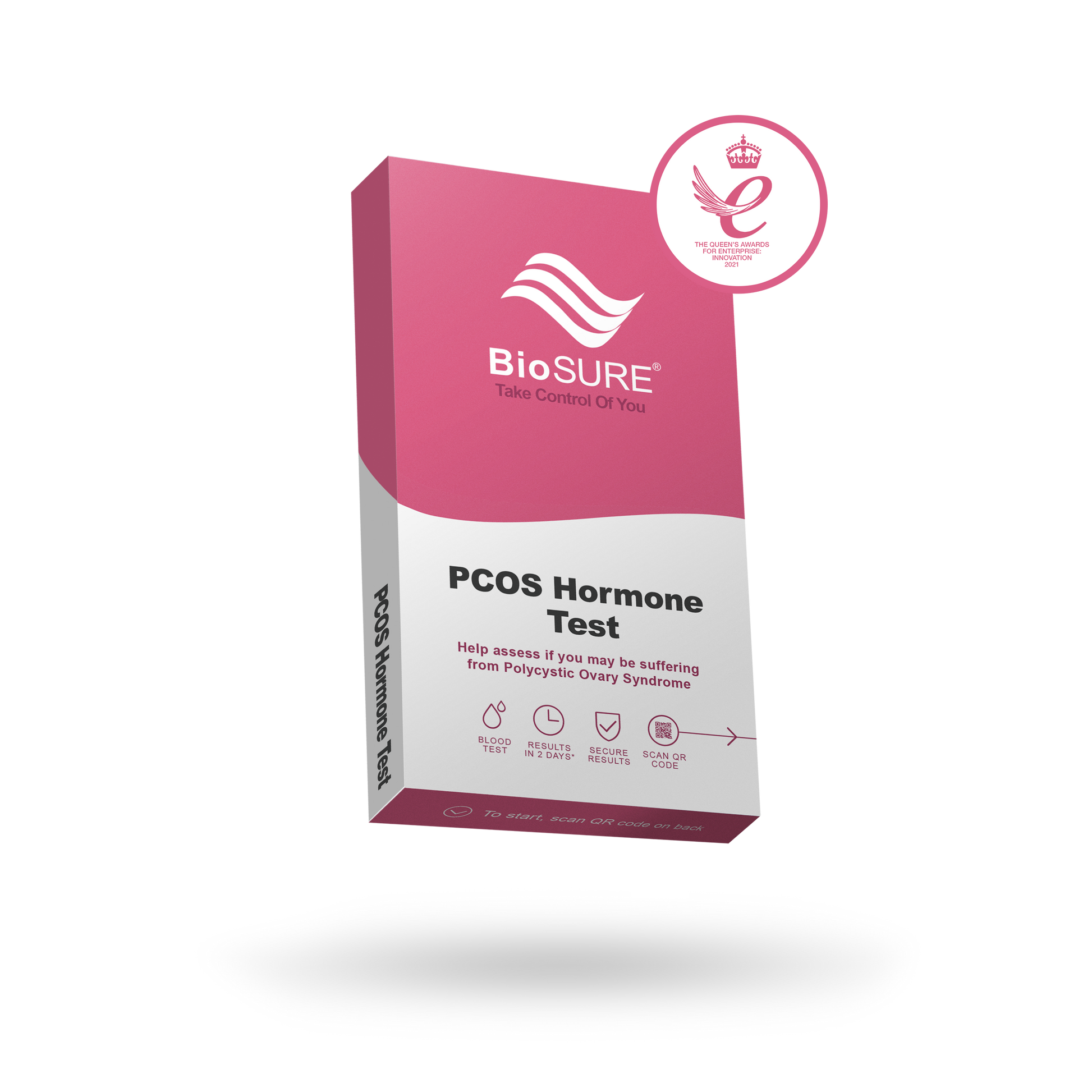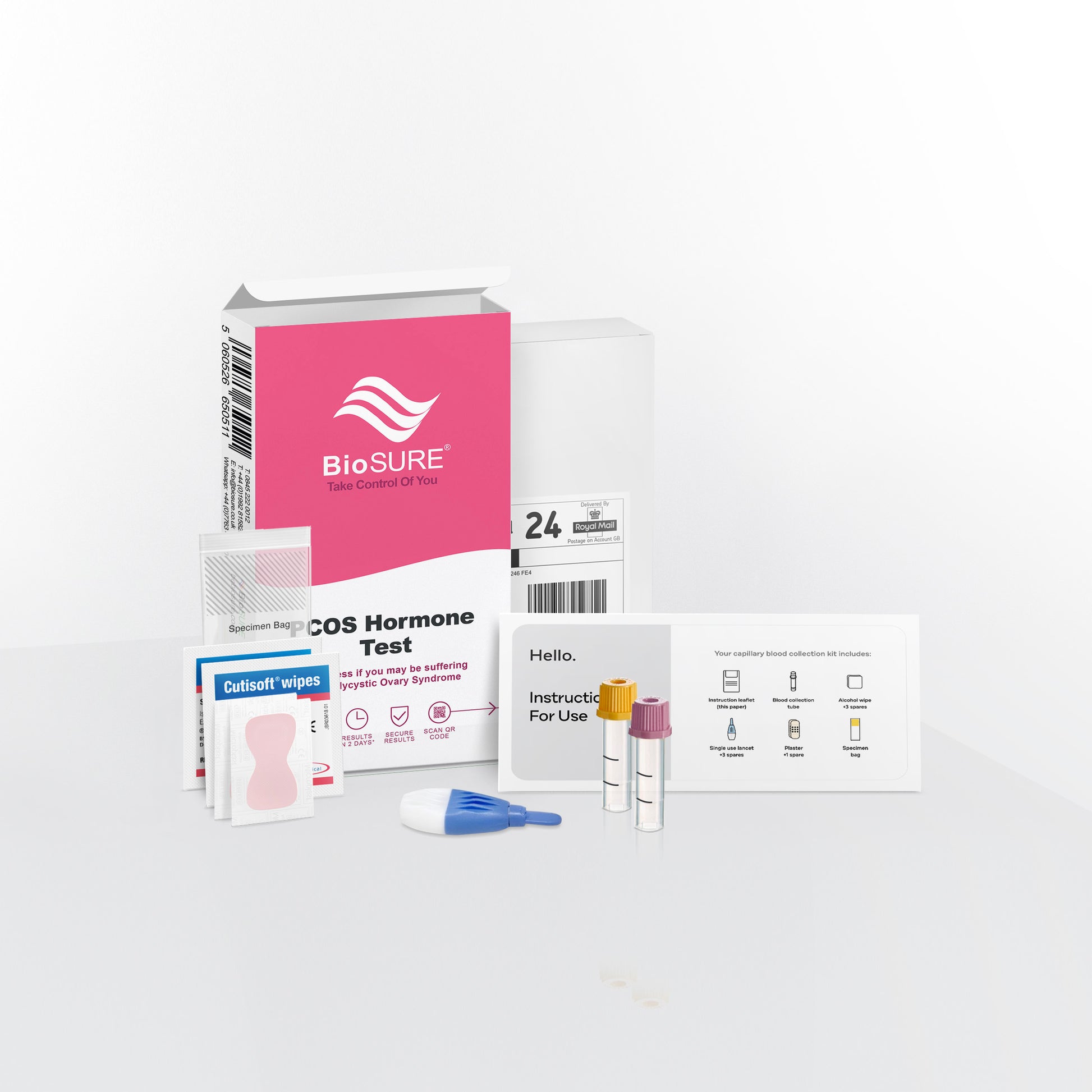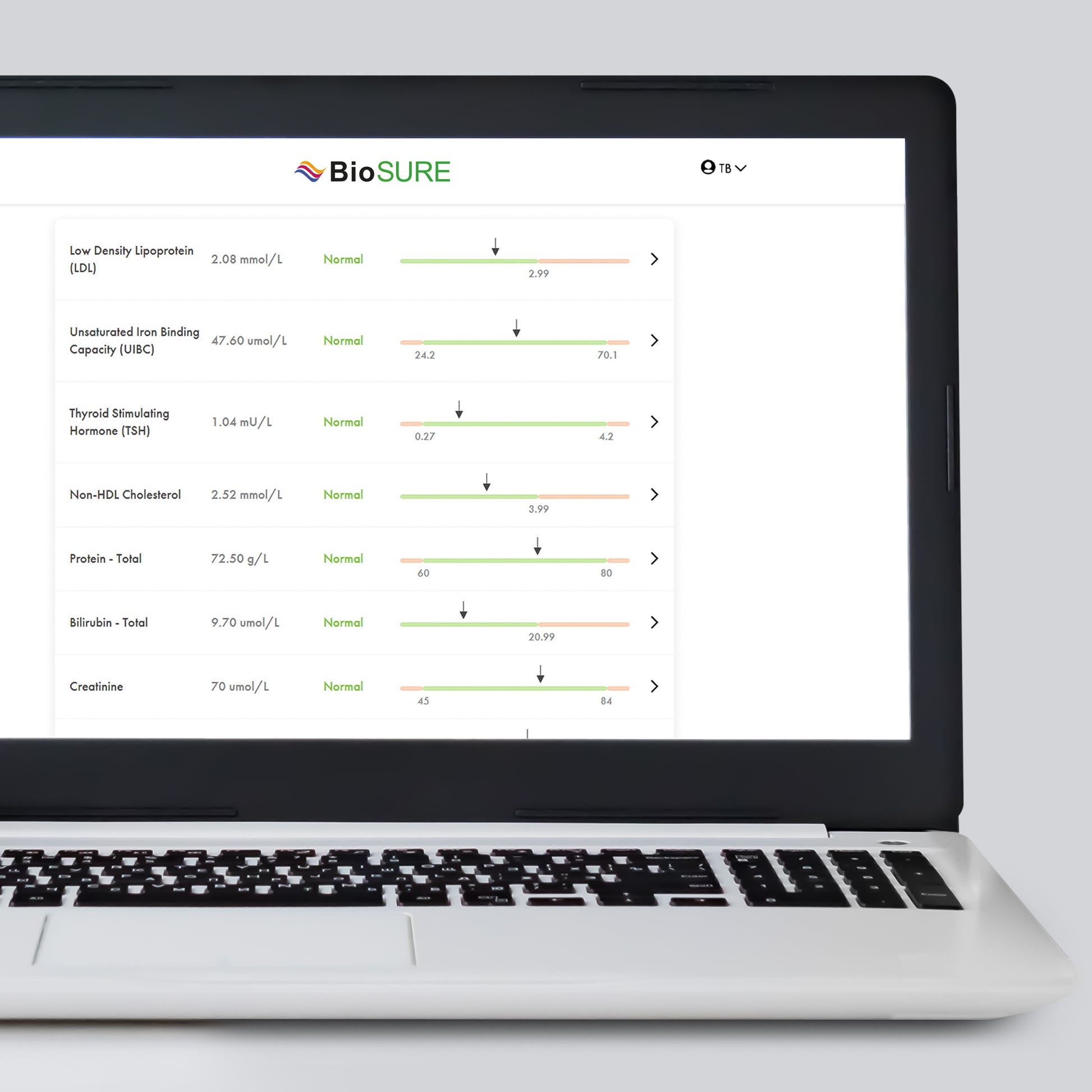BioSURE Polycystic Ovary Syndrome (PCOS) Test
BioSURE Polycystic Ovary Syndrome (PCOS) Test
Analyses 5 key biomarkers to help you assess if you may be suffering from Polycystic Ovary Syndrome, so you can take out the guesswork and take action to manage your symptoms.
Couldn't load pickup availability
5 Biomarkers
Fingerprick Blood Sample
Lab Test - results within 48 hours
Free Two Way Delivery Included
Why test for PCOS?
One in 10 women in the UK suffer with PCOS and it is the leading cause of infertility.
If you are experiencing irregular periods, or missing them altogether, have excessive facial or body hair or unexpected weight gain then it is worth checking your hormone levels.
This test measures 5 key biomarkers that will help you to understand whether you are suffering from PCOS. Your result will be recognised by your healthcare provider.
View full detailsOur PCOS test measures a range of your hormone levels, including Follicle Stimulating Hormone (FSH) and testosterone, to help assess if you may be suffering from Polycystic Ovary Syndrome or can help to help exclude possible causes of other problems that may mimic PCOS.
There is no single test to diagnose PCOS specifically, but is usually diagnosed as a combination of blood test results and an ultrasound or pelvic exam. Your healthcare provider will recognise your BioSURE results.
You may be referred for an ultrasound and additional blood tests as diabetes and cholesterol are often checked in parralel. You may then be referred to a gynaecologist, which is a doctor with specialist training in treating female reproductive conditions or an endocrinologist, which is a doctor specialised in treating hormone problems.
You should consider testing if you are experiencing symptoms of Polycystic Ovary Syndrome, which can include:
- irregular menstrual cycles or no periods at all
- excessive hair growth - usually on the face, chest or back
- thinning hair or hair loss from your head
- difficulty getting pregnant
- unexplained weight gain
These symptoms usually begin during late teenage years or early 20's.
PCOS is also associated with an increased risk of developing Type 2 Diabetes later in life, which is why testing often happens in parallel.
Polycystic Ovary Syndrome causes your ovaries to produce unusually high levels of hormones, which can cause erratic or missed periods and other symptoms.
This test analyses 5 key biomarkers, to help you assess if your symptoms are likely to be caused by PCOS:
- Follicle Stimulating Hormone (FSH)
- Luteinising Hormone (LH)
- Testosterone
- Sex Hormone Binding Globulin (SHBG)
- Free Androgen Index (FAI) (Testosterone:SHBG ratio)
It is an idea to make a note of which day of your menstrual cycle you take your blood sample as this can help your doctor if you need to discuss your results.
You should consult your doctor before use if you are taking prescribed biotin or nutritional supplements.
Please also consult your doctor if you may have kidney problems, endocrinological (hormonal) conditions or may be pregnant.
This test cannot alone diagnose PCOS, but your result may be used by your healthcare provider in conjunction with your past medical history, clinical examinations and other possible investigations.
Polycystic Ovary Syndrome (PCOS) is a common condition that affects a woman's hormone levels and impacts how a woman's ovaries work. The most usual time this happens is during the reproductive years.
Polycystic ovaries contain higher numbers of follicles, which are essentially small fluid-filled sacs (called cysts) that contain immature eggs. Those with PCOS often have follicles that are unable to release the egg - meaning that ovulation does not occur.
Some women with cysts on their ovaries suffer no symptoms at all, whilst others experience more noticeable symptoms, such as irregular or absent periods, hair growth on the face and body and fertility problems. PCOS can also cause low mood and depression.
Women who experience Polycystic Ovary Syndrome may not always experience symptoms and the severity of symptoms can vary greatly.
Some women put the symptoms down to menstrual problems and some do not know they have PCOS until they have problems being able to get pregnant.
Common symptoms include
- Irregular or missed periods
- Difficulty getting preganant
- Excessive hair growth on the face and body (often the abdomen)
- Weight gain
- Oily skin or acne
- Thinning hair or hair loss from the head
Some women can also experience low mood or feel depressed.
It is not known exactly what causes Polycystic Ovary Syndrome, but there is evidence that is can be triggered by abnormal hormone levels. This can be caused by a variety of reasons including -
- Resistance to Insulin, which is the hormone your pancreas produces to help regulate the amount of sugarin your blood. High levels of insulin can cause your ovaries to produce too much testostrone, which can interfere with ovulation.
- Sometimes PCOS can be genetic and run in families, but the specific genes have not yet been identified. If you have an aunt, mother or sister who has PCOS, then your own risk is thought to be increased.
- General hormone imbalances can trigger PCOS, but again the exact causes are not known. They might be because the ovary itself produces more hormones or it may be the because of the part of your brain that controls this.
Most women with PCOS have an imbalance of certain hormones:
- Testosterone - this is usually thought of as a male hormone, but all women produce small amounts of it. With PCOS levels of testosterone increase.
- Raised levels of luteinising hormone (LH) – this stimulates ovulation, but may have an abnormal effect on the ovaries if levels are too high.
- Low levels of sex hormone-binding globulin (SHBG) – a protein in the blood that binds to testosterone and reduces its effect.
PCOS is a common condition and the most common cause of female infertility.
PCOS affects about 1 in every 10 women in the United Kingdom.
There is no cure for PCOS, but the symptoms can be treated.
There are medicines that can be used to help treat irregular periods, fertility issues and excessive hair growth on the face and body.
Eating a healthy, balanced diet can sometimes make symptoms improve and if you are overweight, weight-loss is clinically advised.
Most women with PCOS are able to have treatment and get pregnant.
Free two-way shipping is included
Standard DPD delivery to you is included in the price and your kit also includes a Royal Mail 1st Class Tracked label for you to send your sample back.
All orders received by 2pm are shipped the same day. Orders received after 2pm on a Friday will be shipped the next working day.
A kit containing everything you need is sent to an address of your choice.
You can then take a simple finger prick sample, using the lancets provided and collect the drops into the tube. You then register it on-line and post it off to the laboratory using the Royal Mail 1st Class Tracked envelope that is included with your kit.
Your full report, showing your results and how they compare with the normal reference ranges, are reported back to you by email. You will receive your result the day after the lab receives your sample.
All test results are reviewed by the in-house GPs who highlight any areas of concern of that might need further investigation and follow up with a doctor.
No, you do not need to fast for this test, but it is recommended that you take your sample first thing in the morning.
Yes, your healthcare provider will recognise your clinically-valid results.
Early diagnosis is key to managing any health condition and means an increased range of treatment options, improved long-term health and improved quality of life.
It is unlikely to gain a definitive diagnosis from a blood-test but your results can be used to have informed discussions with your healthcare provider.
Your results link will be sent to you via email, so you can log in to your secure account and view your results.
Your results include your levels and where they sit against 'normal levels'. There is also a visual interpretation as a colour coded graph so they are easy for you to understand.
Your blood sample will be processed in the laboratory within 24 hours of receipt on all working days. You will receive an email with a secure link through to your account and your results.
It is very important you scan your unique QR code when you open your kit, as this is what links your sample and your result to you. Without this we won't be able to send you your result.
Yes, your samples are processed in the same laboratories that are used by hospitals and primary care providers. All of our labs are UKAS and ISO accredited, which are the highest levels of accreditation.
Your BioSURE Self Test kit contains -
- Instructions for Use
- Collection tube(s)
- Alcohol wipe x 2
- Lancet x 4
- Collection tube label(s)
- Pre-paid return packaging
We advise collecting your fingerprick blood sample in the morning, especially for tests that require fasting. Return on the same day in the pre-paid packaging that is supplied with your kit.
We also advise not collecting or returning your sample on Friday, Saturday or Sunday, so the lab receives it in the best possible condition.








